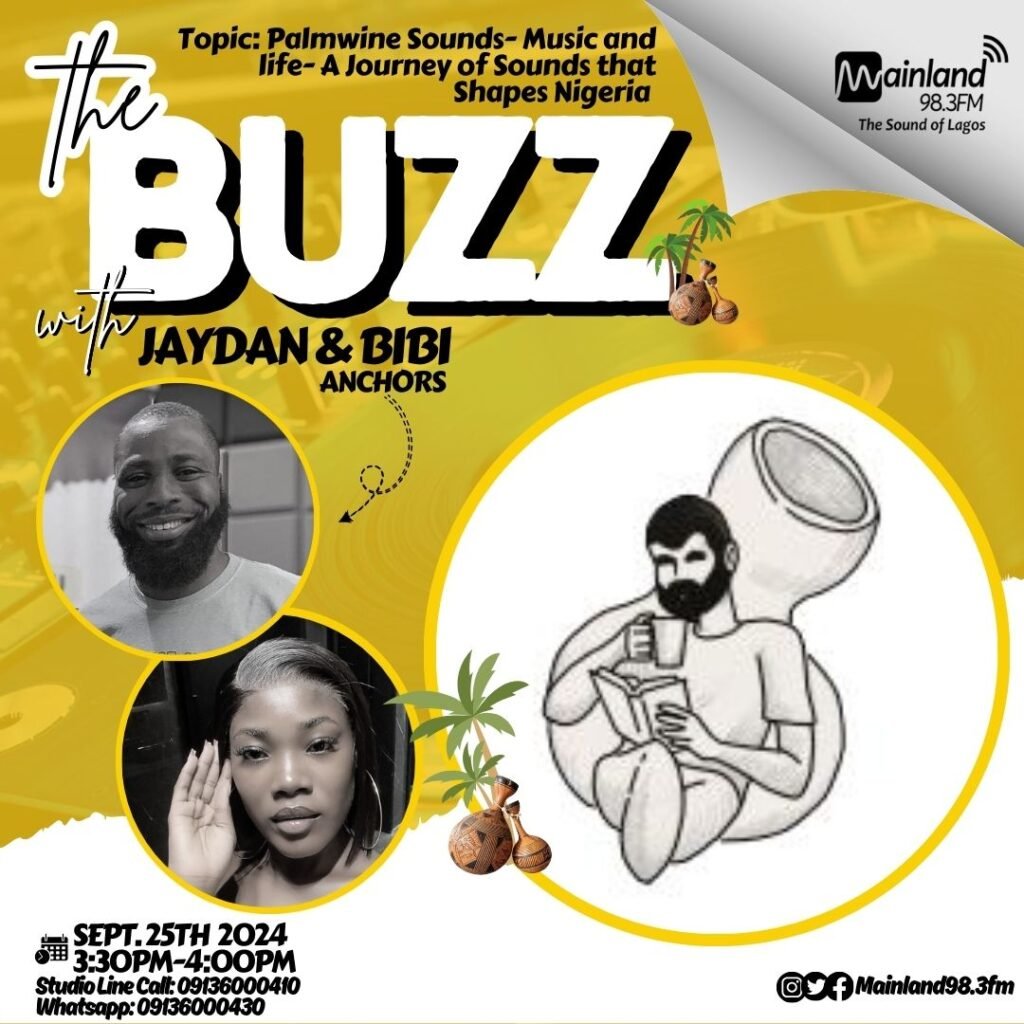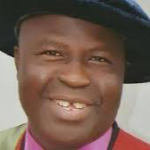( An Exclusive Interview )
Palmwine Sounds, a poet and instrumentalist, remains an enigma in the creative world with eight published books to his name. He is known for his deep connection to music, an obsession with Fela Kuti’s sound, and a unique take on poetry that combines raw emotion and lyrical finesse.
Despite his growing fame, Palmwine Sounds prefers to keep a low profile, living in anonymity while his works speak volumes.
In this exclusive interview with Mainland FM 98.3FM Lagos, Palmwine Sounds delves into his influences, love for Afrobeat, his books Life and Death and Music and Life, and his thoughts on the evolving music scene.

Mainland FM: We are thrilled to have Palmwine Sounds on the show today. First off, tell us a little about yourself. Why the name Palmwine Sounds?
Palmwine Sounds: Thanks for having me. So, why Palmwine Sounds? Well, it all goes back to my love for music. I think I know almost every song, at least when it comes to Afrobeat and the sounds that influence it. The name itself comes from a track on Fela Kuti’s *Fear Not for Man* album. The second track is called *Palmwine Sound*, and it’s this instrumental masterpiece. That’s how I came up with the name, because that track resonates with me deeply.
Mainland FM: You’ve published two major books, *Life and Death* and *Music and Life*. What was the inspiration behind these books?
Palmwine Sounds: Music and Life came first, actually. It was born out of a collaboration that didn’t work out with a friend. But music is something I’m deeply connected to, so I decided to run with the idea solo. I think my poetry has always revolved around music, whether it’s in Life and Death or anywhere else. I have this deep appreciation for music from all generations, and that’s what Music and Life reflects—a mix of past and present sounds, emotions, and influences. Sometimes when I write, I look back and wonder, “Did I really write that?” It’s like I’m surprising myself each time.
Mainland FM: Speaking of influences, Lagos is known for its rich musical heritage. How would you describe the relationship between Nigerian music, past and present, particularly the Palmwine sound?
Palmwine Sounds: The way I see it, Nigerian music today is deeply rooted in its past. There’s a lot of sampling, and the rhythms are pretty much the same. You can listen to a modern Afrobeat track and feel the influence of old-school highlife or Fela’s sound. The instruments—percussion, trumpets—they’re all still there. The only difference is how they’re produced and mixed today. But overall, the essence remains the same. It’s a cycle; in 20 years, we’ll be looking back at Davido and Burna Boy the same way we look at legends from the past.
Mainland FM: You’ve also mentioned a new genre, Zumunta. Could you explain what that’s about?
Palmwine Sounds: Zumunta is a genre that’s not very well-known, even though it’s been around for ages. It’s rooted in Northern Nigeria, and you can hear it a lot in Ecwa churches. What’s interesting is that it blends Igbo percussion with northern influences. It’s not far off from Fela’s Afrobeat in terms of rhythm. I’ve been trying to find more information on it, but there isn’t much out there. I think it has the potential to be something big, and I’m working on incorporating it into my sound more.
Mainland FM: That sounds fascinating. What inspired you to experiment with Zumunta?
Palmwine Sounds: It’s actually funny. When I was younger, I lived near a church where they would practice this type of music. I wasn’t really into attending church, but I was drawn to the music. The bass, the percussion—it just stuck with me. As I got older and started creating music, I thought back to that sound and decided to experiment with it. I gave the basics to a producer, and he helped bring it to life. It’s something I’d love to explore more with a live band when the time is right.
Mainland FM: You mentioned you’d like to collaborate with new-generation artists. Do you have anyone in mind?
Palmwine Sounds: I’ve thought about collaborating with some of the alte artists—Show Dem Camp, BOJ, people like that. I’m also really intrigued by Odumodu Black. There’s this genre of Igbo music called Odumodu that’s heavily focused on vocals. I think we could create something really unique with his voice and my percussion-driven sound. Who knows? Maybe one day it’ll happen.
Mainland FM: With eight books under your belt, that’s quite an achievement. What’s the driving force behind your poetry?
Palmwine Sounds: I think it all comes from my emotions, to be honest. I tend to keep my books short because I have this playful, almost childlike outlook on life. But when things get tough, my writing reflects that. A lot of my poems come from a place of introspection and personal experience. I also draw heavily from the music I grew up with—Osita Osadebe, Fela, reggae. People tell me I have an old soul because I listen to so much classic music.
Mainland FM: Your poetry, especially in Life and Death, deals with heavy themes. What was your mindset when writing it?
Palmwine Sounds: Life and Death is a reflection of the things I think about every day—existence, mortality, the cycle of life. It’s a broad theme, so it gave me a lot of freedom to explore different emotions and experiences. Funny story, when I first wrote Palmwine Sounds at the Bar, it was only 10 lines long. I sent it to a friend, and she pushed me to expand it. It eventually grew to 7 or 8 pages, and I’m glad she challenged me because that poem ended up being a favorite.
Mainland FM: Do you prefer old-school or new-school music?
Palmwine Sounds: I don’t really take sides. I love live instruments, and the old-school sound has that in abundance. But I appreciate what new-school artists are doing, too. They’re blending instruments with modern production in ways that are really exciting. I’ve been listening to Seyi Vibez, for example, and he’s bringing something fresh to the table.
Mainland FM: Thanks for joining us today. Will we ever see you reveal your identity?
Palmwine Sounds: (Laughs) I’ll think about it. For now, I’ll keep letting the music and poetry do the talking. Thank you for having me!







